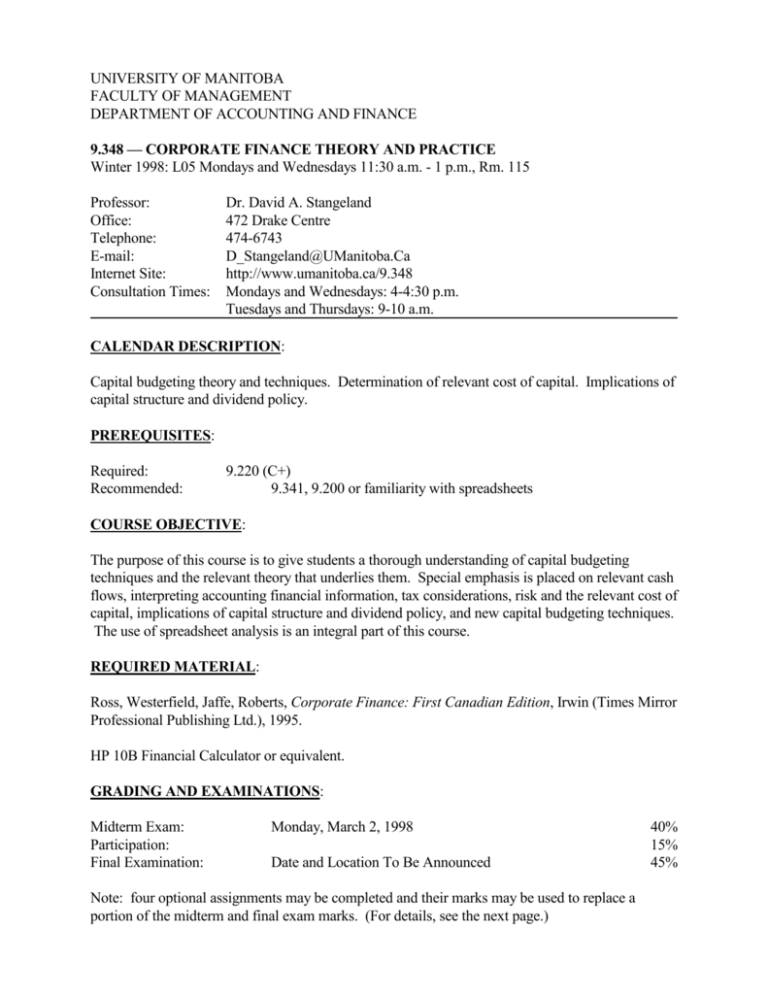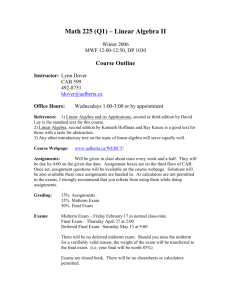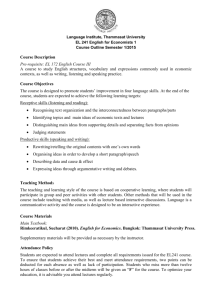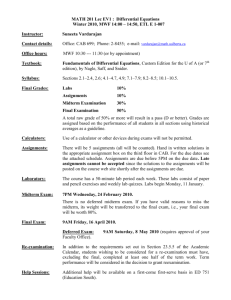this link - University of Manitoba
advertisement

UNIVERSITY OF MANITOBA FACULTY OF MANAGEMENT DEPARTMENT OF ACCOUNTING AND FINANCE 9.348 — CORPORATE FINANCE THEORY AND PRACTICE Winter 1998: L05 Mondays and Wednesdays 11:30 a.m. - 1 p.m., Rm. 115 Professor: Office: Telephone: E-mail: Internet Site: Consultation Times: Dr. David A. Stangeland 472 Drake Centre 474-6743 D_Stangeland@UManitoba.Ca http://www.umanitoba.ca/9.348 Mondays and Wednesdays: 4-4:30 p.m. Tuesdays and Thursdays: 9-10 a.m. CALENDAR DESCRIPTION: Capital budgeting theory and techniques. Determination of relevant cost of capital. Implications of capital structure and dividend policy. PREREQUISITES: Required: Recommended: 9.220 (C+) 9.341, 9.200 or familiarity with spreadsheets COURSE OBJECTIVE: The purpose of this course is to give students a thorough understanding of capital budgeting techniques and the relevant theory that underlies them. Special emphasis is placed on relevant cash flows, interpreting accounting financial information, tax considerations, risk and the relevant cost of capital, implications of capital structure and dividend policy, and new capital budgeting techniques. The use of spreadsheet analysis is an integral part of this course. REQUIRED MATERIAL: Ross, Westerfield, Jaffe, Roberts, Corporate Finance: First Canadian Edition, Irwin (Times Mirror Professional Publishing Ltd.), 1995. HP 10B Financial Calculator or equivalent. GRADING AND EXAMINATIONS: Midterm Exam: Participation: Final Examination: Monday, March 2, 1998 Date and Location To Be Announced Note: four optional assignments may be completed and their marks may be used to replace a portion of the midterm and final exam marks. (For details, see the next page.) 40% 15% 45% GRADING AND EXAMINATIONS: (continued) Four assignments will be distributed (via the Internet site) during the term. Use of computer spreadsheets is encouraged (and sometimes required) for each assignment. Assignment marks may be used to lower the weights of the midterms and final as follows: If assignment 1 is completed and its % mark is greater than the Midterm % mark, then it will count for 5% of the overall mark and the Midterm weight in the overall mark will be reduced by 5%. If assignment 2 is completed and its % mark is greater than the Midterm % mark, then it will count for 5% of the overall mark and the Midterm weight in the overall mark will be reduced by 5%. If assignment 3 is completed and its % mark is greater than the Final Exam % mark, then it will count for 5% of the overall mark and the Final’s weight in the overall mark will be reduced by 5%. If assignment 4 is completed and its % mark is greater than the Final Exam % mark, then it will count for 5% of the overall mark and the Final’s weight in the overall mark will be reduced by 5%. Assignments are due on the date and time specified. Early submissions of assignments may be made with no penalty. Late assignments receive a % mark of zero. No exceptions! The final grade will depend upon the specified weighting scheme and the overall performance of the class. Students who miss a midterm will receive a mark of zero unless a valid medical excuse with supporting written documentation is presented. Students who miss an assignment (with or without an excuse) will lose the ability to have the assignment's weight offset an exam's weight. No make-up exams or assignments will be scheduled; students with valid medical excuses who miss a midterm will have the midterm’s weight in the overall mark added to the final exam’s weight. The final exam mark will then apply to all the above options related to the assignments. Students are reminded that they must remain available to write the final exam up to and including April 29, 1998. Note: all assignments, exams, etc. are to be on an individual basis. You are not permitted to use the material of another student. Such use, or the allowance of such use constitutes a violation of the Faculty’s code of academic integrity and is subject to severe consequences. All suspected breaches of academic integrity will be reported to the office of the Dean. PRACTICE QUESTIONS/MATERIAL: A time-value review handout and a sample quiz will be distributed in the first class. These will assist students in reviewing the prerequisite (9.220) material that is assumed knowledge for this course. Students should ensure that they are capable of completing the quiz with 100% accuracy. In addition to the assigned readings and assignments, students are encouraged to do the “Concept Questions” and the suggested “Questions and Problems” at the ends of the assigned chapters. When doing the suggested questions, students should remember that some are for review of material from other courses, some are comparable to the difficulty of questions on exams, and some are meant to be extra challenges for the motivated student who desires a top mark. It is up to you, the student, to determine which questions you feel are necessary to review to give you sufficient preparation for the exams. TENTATIVE COURSE OUTLINE: Although some of the readings overlap with those of 9.220, the material is covered in more depth. Supplemental material is placed on reserve in the library. Further readings and/or handouts may be assigned as the term progresses. It is the student's responsibility to read the assigned material prior to the relevant class. Dates Description Assigned Reading January 5 Overview of course. Distribution of syllabus, time-value, sample-quiz, and suggested-problems handouts. Ch. 1; Time-value handout; Sample-quiz handout; Suggested-problems handout. Jan. 7-12 Translating from accounting financial statements into relevant cash flows. Assignment 1 distributed January 12. Ch. 2; Reserve reading material #1. Jan. 14-19 Review of basic capital budgeting techniques; mutually exclusive projects; independent projects; capital rationing. Ch. 6 Jan. 21-26 More on relevant cash flows and basic Canadian tax issues. Ch. 7, 1A, 7A Jan. 28-Feb. 4 Intermediate capital budgeting techniques: inflation adjustments; equivalent cash flows. Ch. 7 Assignment 1 due 12 noon, Friday, Jan. 30. Feb. 9-11 Investment timing. Assignment 2 distributed February 11. Feb. 16-20 Reading Week: no classes and no consultation times Feb. 23-25 Strategy and analysis using NPV: positive NPV’s; decision trees; sensitivity analysis; scenario analysis; break-even analysis. Reserve reading material #2; Calculus review Ch. 8 Assignment 2 due 12 noon, Friday, Feb. 27. March 2 Midterm Exam: in class Mar. 4 Risk, return and capital budgeting. Ch. 12 Mar. 9-11 Capital Structure Theories and Financial Distress. Assignment 2 distributed March 9. Ch. 15, 16, 30 Mar. 16-18 Adjusting capital budgeting techniques for levered firms. Ch. 17 Assignment 3 due 12 noon, Friday, March 20. Mar. 23-25 Dividend policy. Assignment 4 distributed March 25 Ch. 18 Mar. 30April 1 Options and corporate finance: implications on investment strategy; advanced capital budgeting (valuation) techniques, hedging risk. Ch. 21, 24 Apr. 6-Apr. 8 Leasing. Ch. 23 Assignment 4 due 12 noon, Thursday, April 9. ACADEMIC INTEGRITY: It is critical to the reputation of the Faculty of Management and of our degrees, that everyone associated with our faculty behaves with the highest academic integrity. As the faculty that helps create business and government leaders, we have a special obligation to ensure that our ethical standards are beyond reproach. Any dishonesty in our academic transactions violates this trust. Page 31 of the University of Manitoba General Calendar addresses the issue of academic dishonesty under the heading "Plagiarism and Cheating". Specifically, acts of academic dishonesty include, but are not limited to: using the exact words of a published or unpublished author without quotation marks and without referencing the source of these words duplicating a table, graph or diagram, in whole or in part, without referencing the source paraphrasing the conceptual framework, research design, interpretation, or any other ideas of another person, whether written or verbal (e.g., personal communications, ideas from a verbal presentation) without referencing the source copying the answers of another student in any test, examination, or take-home assignment providing answers to another student in any test, examination, or take-home assignment taking any unauthorized materials into an examination or term test (crib notes) impersonating another student or allowing another person to impersonate oneself for the purpose of submitting academic work or writing any test or examination stealing or mutilating library materials accessing tests prior to the time and date of the sitting changing name or answer(s) on a test after that test has been graded and returned submitting the same paper or portions thereof for more than one assignment, without discussions with the instructors involved. Group Projects and Group Work: Many courses in the Faculty of Management require group projects. Students should be aware that group projects are subject to the same rules regarding academic dishonesty. Because of the unique nature of group projects, all group members should exercise special care to insure that the group project does not violate the policy on Academic Integrity. Should a violation occur, group members are jointly accountable unless the violation can be attributed to a specific individual(s). Some courses, while not requiring group projects, encourage students to work together in groups (or at least do not prohibit it) before submitting individual assignments. Students are encouraged to discuss this issue as it relates to academic integrity with their instructor to avoid violating this policy. In the Faculty of Management all suspected cases of academic dishonesty are passed to the Dean's office in order to ensure consistency of treatment.








